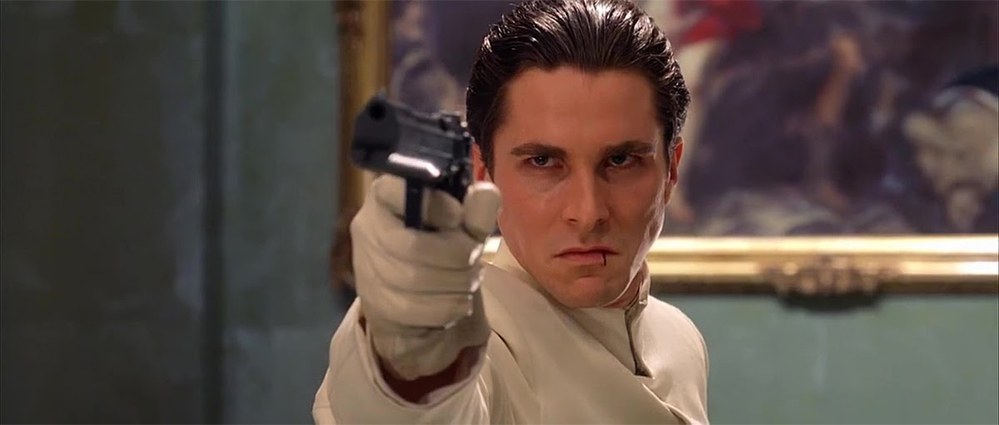We all have niche loves in our lives, something we hold dear that might not get the same mileage for everyone. Off the Beaten Path is a Lewton Bus series where members of the crew will discuss something or someone they hold dear to their hearts that might not be in the mainstream, or doesn’t feel like it gets the appreciation it deserves.
As a writer, Kurt Wimmer has made a name for himself by making films with fun elements and a tendency to punch above their weight, thematically speaking. Equilibrium is no exception, since it’s basically 1984 by the way of a super badass action film. But unlike other Wimmer-penned movies, Equilibrium has a special edge to its advantage: Wimmer as a director.
From a worldbuilding standpoint, the film can be described as a precursor to the Young Adult wave in the late 2000s and early 2010s. It takes place in a post-war dystopia under a totalitarian regime (in this case, people are stopped from having emotions with medication), there’s Nazi imagery as subtle as a Times Square billboard, the protagonist (Christian Bale as government enforcer John Preston) is in their twenties, is part of a status quo that they’ll learn to oppose, and the story has a fairly prominent romantic angle that’s affected by the protagonist’s position in the world.
Wimmer’s aesthetic approach is very much a product of its time, but that doesn’t stop it from having a distinct personality of its own. Equilibrium’s world, where gray and black are the predominant colors, perfectly conveys the essence of a society that’s forbidden to feel under the pretense of peace and order. The armed forces that patrol the streets wear helmets to be dehumanized and become instant avatars of repression. The clothes of the authority figures are long and dark, pretending that their job has a religious connotation (the enforcers are referred as “Clerics”). The fact that the people living in this world are over-controlled and ideologically astray becomes quite harrowing in certain scenes. Especially the ones involving cold-blooded mass murder at the hands of the government.
Equilibrium stood out among other Matrix-era action films thanks to a fighting style amusingly denominated Gun-Kata. It was cartoonish and over the top, almost like watching an anime come to life. However, it was also a carefully planned method where the core idea was to reach an ideal balance between martial arts and gunplay in the heat of combat (and looking incredibly cool in the process). Preston fights in way that places him several steps ahead of his opponents, using unconventional moves like dropping gun magazines on the floor or keeping them under his sleeves. Tricks like these help him to save time, ammo and space between him and his targets, achieving an instantly lethal impact. Not only does it work like gangbusters aesthetically, it’s a fundamental part in conveying Preston as a smart and confident warrior dealing with a grief that has been waiting to explode for quite some time. There’s something about Gun Kata’s acrobatic flow that makes it immensely satisfying to see unfold on screen. In a way, it was a more exaggerated version of the choreography we latter witnessed in the John Wick series.
The quality that elevates Equilibrium the most is Christian Bale’s excellent work as Preston. He plays a man who’s coming to terms with his newfound mindset and sentiments, but has to go through them alone because expressing them threatens his life. Bale pulls off a mostly internal performance with just the minimum hints to understand Preston’s struggle. As for the action, he displays a sleek physicality that sells Preston as considerably superior to his colleagues. This plays out a bit differently in his scenes next to rival enforcer Brandt (Taye Diggs), where the fights are used to set tension between them, despite their brevity. Especially since Brandt is the one man who can match Preston’s skillset. Bale’s range and star power are the key reason why each of the stages in Preston’s path towards emotional liberation hit cathartic notes.
Wimmer’s directing career came to an end with the critical and commercial failure of Ultraviolet (not to mention its troublesome post-production). It’s unfortunate, because his knack for bombastic action filmmaking had the potential to grow over time, even with rough edges in the writing. Later on, his filmography as screenwriter had some estimable entries (The Recruit, Law Abiding Citizen), but they never reached the heights that turned Equilibrium into an idiosyncratic action landmark on its own right.
Is Equilibrium silly and derivative? Absolutely. Does it matter? Not one bit, because it’s still a blast from beginning to end. If anything, the turn-of-the-millennium cheesiness is part of the fun. Sometimes, all you need is Christian Bale killing a bunch of fascists to defend a dog.








